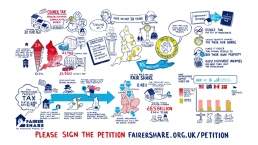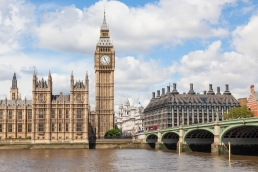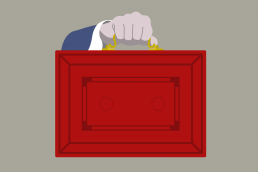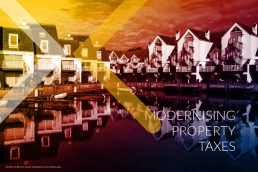Our Response to Anthony Browne’s Review of PPT
Since launching Fairer Share in the spring of 2020, we have been inspired by the 100,000 households who have signed our petition calling for reform. These have come from all walks of life – young families struggling to get by in the face of rising Council Tax bills, hard-working families in tenanted accommodation, grandparents wondering how their grandchildren will find a way onto the property ladder, the housing industry looking for alternatives to Stamp Duty.
We have appreciated the support and encouragement of leading think tanks and academics. We have been excited by our engagement and interaction with leading MPs from across the political spectrum.
Feedback has been extremely positive. And we welcome the thorough, if somewhat unfavourable, review of our policy undertaken by Anthony Browne, the MP for South Cambridgeshire, who wrote in The Spectator that such a reform 'would be a disaster'.
Mr Browne has a great deal of experience in these matters and we appreciate the time he has taken to consider our reforms. We feel it is only fair to him and also to our many supporters, who will want to make sure they are backing the right horse, that we examine Mr Browne’s concerns in detail. We have responded in a Q&A format below.
The Spectator
A proportional property tax would be a disaster (19 January 2021)

Anthony Browne MP
Two of the most unpopular taxes in Britain are stamp duty and council tax, property taxes both, seen as economically damaging and unfair. So it is not surprising there is a noisy campaign, gaining widespread coverage, to abolish them both and replace them with a simple 'proportional property tax'. The more your home is worth, the more you pay — what could be fairer and simpler?
Fairer Share
Well said, and on this we obviously agree.
Anthony Browne MP
Although well intentioned, this new property tax is a genuinely bad idea. To be revenue neutral for the Treasury, campaigners estimate it needs to be set at 0.48 per cent of the value of the property per year — so that someone with a £1 million home will pay £4,800 a year in this tax. In other words, you would have to give about 5 per cent of the value of your home to the government every decade.
Fairer Share
Just as a reminder, we propose to abolish Stamp Duty. In January, Mr Browne spoke very eloquently about the benefits of scrapping this economically inefficient tax during the Stamp Duty Land Tax (Temporary Relief) Bill debate.
Under the current system, someone who is planning to buy a £1 million home will have to pay £43,750 in tax before they have even collected the keys. Paying 4.8% over 10 years with Fairer Share is better than paying 4.4% up front. And, of course, the house buyer would be paying Council Tax as well over the 10 years – this could equate to a further 3%, and probably more.
Anthony Browne MP
The obvious losers are the asset rich and cash poor, who live in a valuable home but don’t have much income. That covers not just pensioners but downshifters who have paid off their mortgage and taken a lower income job and those who inherited and moved into a family home. Others will be workers on a steady income — such as teachers — who happened to move to an area that then experienced property price rises. These are people who will simply be taxed out of their family homes.
Fairer Share
No one will be taxed out of their homes. Those living in houses valued at £500,000 or less (90% of all households in England) are likely to see a reduction in their tax bills because the future proportional property tax will be less than their current Council Tax payments.
Anthony Browne MP
One possible solution is to allow them to roll over their tax debts until their home is sold or until death, but it is seriously unfair for the government to impose a tax that it knows is unpayable and force people to build up huge tax debts.
Fairer Share
For owners of high value homes the increase in tax would be capped, so that at the point of transition, no household would see a rise of more than £100 per month (£3.29 per day). And as Mr Browne suggests, we would provide these households with the option to roll over the tax payment, at a modest interest rate, until point of sale or change of ownership.
However, any debts built up as a result of deferring a payment would be considerably lower than wealth gained from rising house prices. Assuming 4.8% annual house price inflation, housing assets would increase at 10 times the speed of any tax liability. House prices would have to increase at less than 0.48% per year for the tax debt to exceed the value of the housing asset.
Just to be clear, and this is a very important point, absolutely no one will be forced out of their homes. If they live in a modest home, they will see a reduction in their tax bill. If they live in a larger property, they can either choose to pay the additional charge, which even for the largest and most valuable homes would be capped at a £1,200 increase per year or they can choose to defer payment until they sell the property.
Anthony Browne MP
Such a tax would be powerfully anti-aspirational: if you improve your home to increase its value, the government would punish you by charging forever bigger tax bills.
Fairer Share
You make the very good point that a tax on the value of the land rather than on the property would encourage improvement of the nation's housing stock. In an ideal world we would indeed have a Land Value Tax which would not increase the tax burden following home improvements. However, the Government have shown very little appetite to implement such a reform.
With a rate of 0.48%, the tax equates to less than 1/200th of the increased value. Would a proportional property tax truly be a disincentive to increase the value of one’s property? Such a payment would be much less than the 20% VAT rate charged on materials, so it could be argued that a proportional property tax at 0.48% per year is no more of a disincentive to improve one’s home than VAT, which is charged at 20% and is paid upfront.
Anthony Browne MP
It would undermine local democracy and accountability, effectively nationalising the revenue raising abilities of local authorities.
Fairer Share
It is for this reason we have a fixed national component which would go to central government for redistribution and an initial floating local component which would go to the local authority and could subsequently be moved up or down by that authority. In this way local authorities retain flexibility over taxation and voters can still judge them on value for money. As happens now, there could be limits on how this flexibility to set local rates is used, including the requirement to hold a local referendum if it is proposed that the local share of the tax were to be raised above a certain limit. The Local Government Chronicle covered these important issues in this review.
Anthony Browne MP
It would be introducing Corbyn’s class-envy mansion tax for him, alienating the Conservative base and convincing Labour supporters they are right.
Fairer Share
We respectfully but strongly disagree. This is not a tax increase - overall our policy is revenue neutral. We are scrapping both Stamp Duty and Council Tax, replacing both with a fairer proportional system. On the topic of a proportional property tax, the Daily Telegraph’s Economics Editor Russell Lynch wrote: 'this is not a "mansion tax" or anything like it.' Neither is it in keeping with a wealth tax, which is generally understood to be imposed upon an individual’s entire net wealth.
Meanwhile, we should keep in mind the results of the 2019 General Election, demonstrating the changing nature of British politics and the Government’s subsequent commitment to “Level Up”.
In many ‘Red Wall’ seats, 100% of households would be better off under a proportional property tax, but the benefits would not just be felt in the north of England. Our research shows that households across England would pay on average £435 less property tax each year. At the next general election, the constituencies of South Cambridgeshire, Saffron Walden and Surrey Heath, for example, would all be able to point to savings for the majority of households.
We can highly recommend these two articles in Conservative Home by Kevin Hollinrake (Thirsk & Malton) and John Stevenson (Carlisle). They outline the political arguments and clearly demonstrate this is not a class-envy mansion tax.
Anthony Browne MP
Campaigners say there would be more winners than losers, but it is always the losers who are loudest, and people forced out of their homes shout very loud indeed.
Fairer Share
As previously stated, absolutely no one will be forced out of their homes, and whilst we agree with Mr Browne that there may be objections from those in the wealthiest corners of the country – those with the good fortune of owning more expensive homes or even multiple properties – the fact remains that 76% of households up and down the country would benefit from and welcome this reform.
We believe there will be overall support for a fairer solution, as opposed to the adverse impact the current system is having on other people’s lives. We all want to live in a fair society, and paying the same rate of 0.48% of the property value is surely better than the current system, where someone in Barnsley pays 1% and someone in Battersea pays 0.1%.
Anthony Browne MP
There are fundamental flaws with basing a regular tax payment on the value of a speculatively-driven illiquid asset.
Fairer Share
Should the same argument apply to Council Tax?
Not only is Council Tax out of date, it also taxes tenants - those who don’t even own the property – rather than owners, hitting the asset-poor and income-poor. Given rising levels of Council Tax debt, it clearly does not take into account 'the ability to pay', a problem worsened by recent Council Tax increases that have exceeded current levels of inflation.
Anthony Browne MP
A new train station or cuts in interest rates could push up the value of your property but you would have no extra money to pay the increased taxes.
Fairer Share
As noted, increases will be capped at £1,200 per year and those unable to meet this increase will have the option to defer the bill until the point of sale. The vast majority of households will not require these protective measures. 76% of households will see an immediate reduction in their tax bills.
But you raise a very interesting point which adherents of Henry George may wish me to address. The value of the UK’s housing stock has increased by over £3.5 billion during the pandemic. There are many £3 million+ mansions that have increased by £150,000 in value during the pandemic – arguably this is what is known as ‘unearned’ and untaxed wealth – and owners of such properties have also been in the fortunate position of benefiting from low interest rates and the Stamp Duty holiday, the latter of which Mr Browne aptly described in his SDLT (Temporary Relief) Bill speech as “so effective in rapidly driving up activity in the market and releasing the animal spirit.” These owners of large and high value properties, and many other households, can afford to pay an additional £100 per month in property tax, although again, they have the option to defer.
This topic of ‘unearned’ and untaxed capital appreciation from property ownership is fascinating. I note the comments of Sir Winston Churchill, writing about property and land in 1909, “Roads are made, streets are made, services are improved, electric light turns night into day, water is brought from reservoirs a hundred miles off in the mountains – and all the while the landlord sits still.”
“Every one of those improvements is effected by the labour and cost of other people and the taxpayers. To not one of those improvements does the land monopolist, as a land monopolist, contribute, and yet by every one of them the value of his land is enhanced. He renders no service to the community, he contributes nothing to the general welfare, he contributes nothing to the process from which his own enrichment is derived.”
The south east of England has benefited from the extensive infrastructure investment that has been made in the region – Jubilee Line Extension, Eurotunnel, Heathrow Terminal 5, Crossrail. These projects have fuelled property prices and led to larger discrepancies between house prices in London and the rest of the country. Given these ‘unearned’ and untaxed windfall gains it does not seem particularly fair that the property owners pay a lower tax rate than other parts of the country which have not benefited from this sort of investment. And of course, the higher property prices in London and the south east have made ownership much more challenging for younger generations.
Anthony Browne MP
If it was set at a national rate but collected locally like business rates, those councils with high property prices would get huge tax incomes they don’t need but cheaper areas would get less than they need. One solution is to have locally set rates, but that would mean that high price areas would have low tax rates, and poorer areas would have higher rates — the epitome of unfairness.
Fairer Share
Under a proportional property tax - as historically has happened within local government finance - some councils will receive additional funding from other parts of the local government finance system. The size of this additional funding would be based upon an assessment of the difference between a council's resources (its tax base) and spending needs. As the Institute for Fiscal Studies note, if local tax bases change in size when reforming local taxation and resource equalisation is still a desirable aim of policy then it would require funding levels to adjust, “…increasing them for those [local authorities] whose tax base falls, and reducing them for those whose tax base rises.”
While the exact approach to this adjustment would depend on the context of local government finance at the time, an underlying principle would be to take account of the relative size of a council’s proportional property tax base, and not the revenue that a council intends to generate from that tax base. What this should mean in practice is that two local authorities with similar tax bases and a similar assessment of relative need would receive broadly similar baseline funding levels, irrespective of their local proportional property tax rates.
Anthony Browne MP
These sorts of taxes are common in the US and have destroyed many towns by pushing them into a downward spiral with taxes so high no one wants to live there, so property prices plummet, and their tax revenues fall, so they have to push up the rates, so more people leave. They provoke such constant heated political outrage in the US they make the UK’s stamp duty seem loved.
Fairer Share
The reality is that the current system, through Council Tax and Stamp Duty, already taxes property. The Proportional Property Tax would simply do the same, but would do so more efficiently and more fairly, generating cash savings for 76% of households up and down the country. Our proposed 0.48% rate is substantially lower than that paid in many other parts of the world; in the cities of New York and Miami, annual property tax rates are in excess of 0.85%.
Anthony Browne MP
By contrast, the design of the council tax leads to predictable revenue for councils and bills for residents.
Fairer Share
We are not convinced that Council Tax leads to predictable revenue for councils. Unforeseeable circumstances such as the current pandemic can abruptly and significantly disrupt any revenue flow, including Council Tax, as recently noted by Citizens Advice: “Council Tax is one of the bills that people have been struggling with the most. We estimate that over 3.5 million people are currently behind on Council Tax.” Moreover, an individual council could adjust its proportional property tax rate to keep bills consistently at the same level.
Anthony Browne MP
Such a 'proportional property tax' is clearly a form of wealth tax but imposed on the most sensitive asset that people own — their own home. Normally wealth taxes exclude people’s homes because it is too toxic.
Fairer Share
Surely the same must apply to our current property taxes. Both Stamp Duty and Council Tax are already paid out of post-tax income and assets, and both are based on the value of housing – Stamp Duty specifically, and Council Tax more loosely (the latter is based on property values that have not been updated since 1991).
Furthermore, the £3.29 per day cap on any increase at the point of transition is not in keeping with a wealth tax, which is generally understood to be imposed upon an individual’s net wealth, or the market value of their total assets less their liabilities.
Anthony Browne MP
It is likely that this wealth tax would be expanded quickly to less sensitive assets, such as people’s savings and investments.
Fairer Share
We are not campaigning for any additional taxes. Indeed, it is our belief that a reform of the country’s de facto wealth taxes – Stamp Duty and Council Tax – will negate the need for a wealth tax on people’s savings and assets.
Another advantage of reforming property taxes is that due to improvements in technology, properties can be accurately valued, and unlike financial assets, homes cannot be hidden or shipped offshore. The great British public do not mind paying taxes but they do mind when it transpires that some are not doing their bit or paying their fair share.
It should also be noted that the wealthy have a portfolio of assets, of which property may be just one part, whereas those on more modest means - whose assets are either tied up in property, or who own no wealth at all – are paying up to 1% per year in property tax. The impact is even greater when one considers Council Tax as a percentage of post-tax disposable income.
Anthony Browne MP
But wealth taxes are disastrous. We have been taking evidence on them on the Treasury Select Committee, and the most striking evidence is that almost all countries that introduce wealth taxes end up abandoning them after they have wrought economic carnage. Even the UK’s Wealth Tax Commission, set up to recommend a wealth tax, ended up recommending against them — except possibly as a one-off never-to-be-repeated event to limit the damage.
Fairer Share
We agree and we are not campaigning for a new wealth tax. We are campaigning to reform property taxes so that there is a greater degree of fairness and simplicity.
Within Mr Browne’s constituency of South Cambridgeshire, for example, someone living in a modest band A property pays 0.80%, whereas someone in a higher band H property pays just 0.16% of the property value. In other words, it would appear that Council Tax is a wealth tax that perversely places the greatest burden on those with the least wealth in the first place. We have been inundated with stories from supporters who are struggling to find the money to pay their Council Tax bills.
It would appear that Council Tax has become a wealth tax for modest and low-income households and remains a simple service charge for the wealthy.
Anthony Browne MP
The reason that wealth taxes (which should really be called asset taxes) provoke such anguish is they break a fundamental covenant between individuals and government: work hard and pay your taxes, and what savings and assets you build up in your life you can keep and the government won’t take from you. It is a fundamental right in a liberal property-owning democracy.
Fairer Share
The fact is that the Government already taxes savings and assets through Stamp Duty and Council Tax. And both are paid out of post-income tax earnings.
Drawing on the comparison with existing property taxes, if someone were to buy a £1 million house after the Stamp Duty holiday, they would have to pay £43,750 in tax. This is a direct cost, paid upfront and cannot be thrown in with the mortgage. In addition, the home buyer has lost the future earnings from this large tax payment.
If we make the very reasonable assumptions of 3% house price inflation, 3% capital growth and 3% annual Council Tax increases it would take 45 years for a £1 million home buyer under Fairer Share to be worse off compared to the current system of Stamp Duty and Council Tax. With our reform, the house buyer would have the cashflow benefit of enjoying the saving at a time when it is needed – paying down the mortgage, raising a family etc.
Meanwhile, those who have bought smaller houses will be much better off due to the Proportional Property Tax bill being lower than that of Council Tax.
Following extensive polling, Tax Justice UK published an excellent paper highlighting growing concerns about the gap between the rich and poor and the importance of funding local services, finding that the public support higher taxes and that 74% of the public want the wealthier to pay more. Indeed, 69% supported reforming Council Tax so that it is more closely tied to a home’s current value (including 72% of Conservatives).
Anthony Browne MP
Council tax and stamp duty do need to be reformed. But when you read more about this proportional property tax, just remember: it is not the answer.
Fairer Share
Our solution is very similar to that put forward by leading thank tanks such as Institute for Fiscal Studies, IEA, IPPR, Resolution Foundation, Onward, Centre for Policy Studies. We have combined the best features of each.
And more recently we are grateful for the endorsement for a proportional property tax by leading economists in the national media including Martin Wolf at The Financial Times and Russell Lynch at The Daily Telegraph.
As we can see from our Constituency Data, under a proportional property tax, 56% of all the households in Mr Browne’s constituency would benefit from an average annual saving of £350, and 67% of households living in bands A-D would be better off.
Of course, no system of property taxation will make everyone happy. But a scenario in which a small number of homeowners have enjoyed a large increase in property value and a much smaller rise in their tax bill is surely preferable to the current system under which many hard-working tenants face 5% annual increases in Council Tax whilst not benefitting from a commensurate increase in property value.
If a Proportional Property Tax is not the answer, what is? Alternatives have been proposed.
Some have suggested extra bands for more valuable properties, but this would not raise sufficient revenue to fund the abolition of Stamp Duty and would not resolve the regressive nature of Council Tax.
Some have suggested a local income tax but a hard day’s work is already adequately taxed and does not address the intergenerational issues. As we know, those with greater assets find a way to reduce their income tax obligations.
Some have suggested imposing a Capital Gains Tax on sale of principal homes but this would hinder mobility and block up the housing market.
Some have suggested a 1% wealth tax on all assets, but this would be painful for hardworking families whose assets are primarily in their home, whilst the wealthier would find ways to move financial assets offshore or place in trust.
Households are already paying sufficient property taxes – the problem is that the wrong households are paying the wrong taxes at the wrong times. The current inequity exists within individual constituencies, between regions, and between the generations.
There is a growing political consensus that both Council Tax and Stamp Duty need to be reformed. As we begin to look beyond Covid-19 and deal with the inequalities that the pandemic has accentuated, we should seize the opportunity to scrap both of these taxes and bring in a fair and workable system of property taxation.
In his recent op-ed piece in the Daily Telegraph, Mr Browne’s colleague, Aaron Bell, who took Newcastle-under-Lyme from Labour for the Tories at the 2019 election, said: '...abolishing Council Tax and Stamp Duty and replacing them with a fairer property tax is the right thing to do for millions of people up and down the country. It is also the right thing for the Conservative Party to do if we are serious about delivering to those who voted Tory for the first time in a generation.'
We are indeed grateful to Mr Browne for taking the time to so thoroughly analyse our Proportional Property Tax recommendations, and for his well-informed and penetrating observations, which we trust we have adequately addressed in this piece.
We encourage Mr Browne to take another look at our proposals and we welcome further input.
Andrew Dixon
Founder, Fairer Share
Aaron Bell MP: Tories should scrap hated Council Tax in the wake of Covid crisis
This article originally appeared in Daily Telegraph on February 4th, authored by Aaron Bell, MP for Newcastle-under-Lyme.
As Rishi Sunak seeks to restore the public finances, a fairer property tax system should be part of the answer
Since the 2019 general election, the Prime Minister’s domestic agenda has necessarily been largely dominated by the twin challenges of getting Brexit done and the fight against Covid-19. Now the first item has been accomplished and, thanks to the brilliance of scientists, the vision of our Vaccine Taskforce and the hard work of our frontline NHS staff, the end is in sight on the second.
In the coming months, once the vaccination drive has had the positive impact that we all hope it will, the Government will face a third mighty challenge. As our focus turns to economic growth, and to building back better, we will need to show in no uncertain terms that the Conservative Party has delivered on the promise to level up those towns and cities previously left behind.
With the public finances stretched like never before, I – and an increasing number of Conservative MPs – believe the best way for the Government to show voters that this message has got through is by reforming our outdated property taxes. We should begin by overhauling Council Tax, which is not only based on property values that are thirty years out of date, but it is also deeply unfair – placing the heaviest burden on the young, low-earners, and those living in less prosperous parts of the country.
At the same time as killing off Council Tax, we should permanently abolish Stamp Duty. This terrible tax hinders aspiration and blocks up the property market by disincentivising homeowners of all ages from moving house. Both of these hated taxes could be replaced by a Proportional Property Tax set at a flat rate of 0.48pc of property value, creating a more modern and much fairer system of property taxation. Crucially, this would be revenue-neutral for the Treasury, while resulting in savings for the vast majority of households up and down the country.
Across England, it is estimated that 76pc households would gain under a Proportional Property Tax, with average households paying £435 less property tax a year. In my own constituency of Newcastle-under-Lyme, 97pc of households would benefit. And in some of the other “red wall” seats won from Labour at the last election, more than 99% of households would be better off.
Objections to this reform often focus on the idea of pensioners being forced to sell, however the reality would be rather different. Nobody would be taxed out of their family home. Instead, for anyone struggling to foot the bill for a house that has risen in value, we could allow deferral of property tax at low interest rates, with payment delivered at point of sale. Additionally, a cap of £100 per month on the increase in payments until the point of sale would mean limited increases for those cash rich but asset poor households who choose to stay in their home.
Abolishing Council Tax and Stamp Duty and replacing them with a fairer property tax is the right thing to do for millions of people up and down the country. It is also the right thing for the Conservative Party to do if we are serious about delivering to those who voted Tory for the first time in a generation. This policy can help us turn the Red Wall into a Blue Barricade.
Before the next general election begins to loom on the horizon, voters will be asking what the levelling up agenda has delivered. As the Chancellor seeks to restore the public finances, a fairer property tax system should be part of the answer.
Aaron Bell is the MP for Newcastle-under-Lyme
John Stevenson MP: Property tax reform is key to levelling up the country and the Conservatives’ electoral chances
This article originally appeared in Conservative Home on February 3rd, authored by John Stevenson, MP for Carlisle.
The 2019 general election was won and fought on a clear mantra of “getting Brexit done”. Now that we have left the European Union and as we eventually emerge from the pandemic, it is time for the Prime Minister to re-focus on his mission to level up the UK.
Let’s be in no doubt that the Conservative Party’s electoral chances in 2024 depend to a large extent on whether people across the UK, and especially in the “Red Wall”, feel and see the benefits of this agenda. This was always going to be the case, even before the outbreak of Coronavirus. The pandemic has simply underlined some of the economic and social issues that have existed in Britain for too long. As a result, the task of levelling up has become more urgent.
The first challenge to overcome is one of definition. Who can explain what levelling up actually means? I understand work is going on behind the scenes to do exactly this. This needs to happen at pace alongside a clear set of metrics which can track progress on measures to which people can relate, from local healthcare and educational outcomes to unemployment levels and spending power. By regularly assessing progress in each of these metrics, locally accountable political leaders can identify specific challenges that are relevant to their community and put in place relevant improvement plans.
Second, the public are going to want to see results. Alongside the progress tracker, the Government and local MPs are going to require specific examples which they can use on the doorstep to show that constituents, their families and their communities are better off as a result of voting Conservative.
Brexit and then Covid have limited the amount of time and resource the Government can spend on working up specific policies which can be delivered before the country next goes to the polls and which chime with the electorate. Major infrastructure programmes are needed but these are often projects that take years to initiate and have little traction at a community level until final completion. As the saying goes, all politics is local.
Of course, the state of the public finances is also a huge problem for the Government. Any change of policy has to therefore be assessed on whether it delivers against a clearly defined vision of levelling up, whether local people can see and feel the benefits in their everyday lives, and whether it is cost-neutral or (ideally) a revenue raiser for the Treasury.
This is why a fundamental reform of property taxation is so appealing and could form a key component of the Government’s efforts to level up the country. The current system is out of date, confusing, unpopular, unequal and most importantly unfair. The Chancellor has acknowledged the need to make the system fairer and property taxes would be the ideal place to start.
The two obvious examples which irritate people from every walk of life are council tax and stamp duty. Council tax is based on property values from 1991 – 30 years out of date. That means that someone living in a house worth £100,000 pays around five times more tax as a share of property value than someone living in a home worth £1 million. Just 29 per cent of the public believe that council tax is calculated fairly and only 26 per cent believe that their own bill is set at the correct level.
Council tax has failed to keep up with the substantial increase in property values, especially in London. This has deprived the Treasury and local councils of much needed revenue and meant that lower income households outside the capital are paying more as a proportion of their home’s actual value than they should be. This has a profound impact, through no fault of their own, on their disposable income.
Stamp duty is a property tax which is an attack on aspiration and ownership. By taxing property transactions, stamp duty discourages homeowners from moving – be it an older couple downsizing or a growing family upsizing – that would lead to more efficient use of the country’s housing stock. The fall in transactions ultimately results in fewer new homes being built because the market signals, to which housebuilders respond, are distorted. Rishi Sunak’s stamp duty holiday to date has mitigated this damage, and wholesale abolition would be an even more potent remedy.
A fairer system would be to completely abolish both council tax and stamp duty and replace them with a new property tax which reflects the current value of people’s homes. A proportional property tax if you will. By setting that tax rate at 0.48 per cent the campaign group, Fairer Share, has calculated that over three quarters of households would be instantly better off.
The average household would see an additional £435 a year in their back pocket, while in some areas of the country such as Bishop Auckland and Bolsover the average household could respectively be £900 and £750 better off each year. Importantly the revenue raised would be split between central government to redistribute across local authorities in the form of grants, and local authorities would take a proportion of the overall rate.
From a political perspective, 97 per cent of households located in the “red wall” seats in England that the Conservatives took from Labour at the last election, would be better off. Traditional Tory seats would also fare well from this policy. In the Chancellor’s own constituency of Richmond, Yorkshire, 92 per cent of households would be better off to the tune of £600 while in South Cambridgeshire the average household would save £350 each year.
Obviously, creating a fairer, more transparent, and up to date property tax system would also mean that some households would end up having to pay more every year to reflect the current price of their home. That is why it is important that any such policy protects these people, who through no fault of their own or indeed through their own renovation work, have benefited from their home increasing in value.
To that extent, Fairer Share is proposing a monthly £100 cap on the total increase any one household could pay which would disappear at point of sale. At the same time – and to help those who are cash poor but living in a high value property – the new tax could be deferred until there is a change of ownership meaning that they wouldn’t lose out financially from the policy.
Replacing council tax and stamp duty with a proportional property tax is the right thing to do for millions of people up and down the country. This reform would have an impact beyond the regional. Ten years of low interest rates have led to increasing asset prices making houses unaffordable for the young and potentially driving them into the arms of the opposition. A solution needs to be found to protect the votes of tomorrow.
Politicians are still chastened by the memory of the negative reaction to the bungled and unpopular poll tax. And since then, council tax and stamp duty have become so unpopular that politicians are anxious about even raising the topic.
But “politics” can no longer be the excuse for failing to implement meaningful property tax reform. The changing political landscape may well be the catalyst for reform. It is the right thing to do from a political perspective, demonstrating that fairness is at the heart of everything the Conservative Party stands for.
With the next election beginning to loom on the horizon, this is a policy which will work on the doorstep and become the perfect flagship policy for the Prime Minister’s vision of levelling up the country.
John Stevenson is the Conservative MP for Carlisle.
Daily Telegraph | Overhaul property tax to save 19 million households £435 per year, MPs urge Chancellor
This article originally appeared in Daily Telegraph on February 3rd, authored by property correspondent, Melissa Lawford.
Proposals for a proportional property tax would lower bills for some – but hike annual costs for others
Conservative MPs have urged the Chancellor to overhaul property taxation by scrapping stamp duty and council tax to slash bills for 19 million English households.
Under plans drawn up by campaign group Fairer Share, stamp duty for primary residences would be abolished and homeowners would no longer pay council tax. Instead, they would pay an annual proportional property tax equivalent to 0.48pc of the value of their home.
Analysis by WPI Strategy consultants found that under the plans, 76pc of English households would be better off, making average savings of £435 per year.
The savings would be funded by tax hikes on homeowners in the more expensive parts of the country, namely London and the South East. Here, they would pay extra taxes initially capped at £1,200 per year.
But when they opted to sell and buy a new property, homeowners would then face an annual bill worth 0.48pc of their property's value, in lieu of paying stamp duty up front.
For a £2m home, for example, this would be equivalent to a total tax bill of £9,600 per year. The buyer would only start paying the higher rate after buying, after benefitting from the abolition of stamp duty.
That would mean the stamp duty saving on buying this £2m property would be £153,750. It would therefore be roughly 19 years before the buyer would start paying more tax overall.
Kevin Hollinrake, a Conservative MP and chair of the Property Research Group, a collection of MPs campaigning for property tax reform, said: “The time is right to put fairness back at the heart of how we tax property.”
He added: “Replacing stamp duty and council tax with a proportional property tax would ensure homes are taxed at their current value. It would also boost transactions throughout the market, creating huge economic output at a time when we most need it.”
Andrew Dixon, of Fairer Share, said that council tax “has led to low-income households paying a tax rate five to 10 times higher than those fortunate enough to live in million pound properties. The wrong households are paying the wrong taxes at the wrong time.”
The current council tax system is based on property values that were made in 1991, which have not been updated in 30 years.
Under this plan for proportional property tax, which would be revenue neutral, in 49 constituencies (all in the North and Midlands) every household would see their annual tax bills reduced. In the most deprived 10pc of constituencies, 99pc of households would benefit.
In the 44 “red wall” constituencies that the Tories won from Labour in the 2019 election, 97pc of households would save £660 per year.
Fairer Share has proposed a cap of £100 per month on existing homeowners’ extra tax bills. This would mean that in the Cities of London and Westminster constituency, 88pc of households would pay an average of £1,050 extra each year.
To protect asset-rich cash-poor pensioners, downsizers could defer paying increases in their tax bill until the point of sale.
Aaron Bell, Conservative MP for Newcastle-under-Lyme, said: “Stamp duty is a terrible tax that limits social mobility and puts families off from moving as their circumstances change. And council tax disproportionately hits renters and those with less expensive properties. I believe it is time for the Treasury to be bold and consider a fundamental reform.”
John Stevenson, Conservative MP for Carlisle, said the property tax system “needs a fundamental overhaul. I would encourage the Chancellor to be a reforming chancellor.”
Will Tanner, of Onward, a think tank, said the system of council tax valuations “bear no resemblance to reality.”
He added: “Council tax is actively working against levelling up: as a share of disposable income, Londoners pay half as much in council tax as households in the North East.”
A Government spokesman said: “We have no plans to make such changes. We have analysed Labour’s plans for such an annual house price tax, which would mean soaring bills for hard-working families and pensioners who have saved and improved their homes. These proposals would have the same faults.”
© Melissa Lawford / Telegraph Media Group Limited 2021;
Think tank endorses Proportional Property Tax in paper to the Chancellor
The think tank Radix has endorsed the Proportional Property Tax in a cross-party submission to the Chancellor. Below is the summary of the paper and its authors. Read the full paper: Modernising Property Taxes.
Modernising property taxes – including by abolishing Council Tax and Stamp Duty and replacing them with a Proportional Property Tax (PPT) – will be key to meeting the UK’s debts post-Covid and should be announced in next month’s budget.
These are amongst the core proposals in a cross-party submission to the Chancellor, entitled Modernising Property Taxes, produced in partnership with leading law firm Shoosmiths LLP. “Out of date, regressive and unfair” are amongst the ways that the series of essays by senior politicians, businesspeople and academics describe both Council Tax and Stamp Duty, while accusing politicians of previously being “too scared” to modernise them.
“That should all change, however,” argues Radix Chief, Ben Rich, pointing out that “Sooner or later, we are going to have to address the debts incurred during the pandemic. The question is against what tax base? Property is hard to hide, so it is an excellent source of income for governments, so long as it is taxed fairly and transparently.
“That’s why Radix and many of the contributors to this paper welcome the recommendation in his essay by Andrew Dixon (Founder of the Fairer Share Campaign) for a Proportional Property Tax to replace Council Tax.
“It is also why we support the recommendation of Michael Johnson (policy adviser on pensions and taxation) to scrap Principal Private Residence relief and make Property Capital Gains Tax payable on all residential property sales, using the new revenue to abolish Inheritance Tax on main properties and Stamp Duty on the purchase of a main home.
“And it is why we welcome the analysis by businessman and academic, Andrew Purves, of taxation in Singapore and Hong Kong, which argues that fairer property taxes could replace a substantial part of the income from direct taxation in the UK.”
In his essay entitled “The Case for Reform”, Conservative MP and Housing Select Committee Member, Kevin Hollinrake, argues in favour of PPT, while the author of Labour’s Land for the Many Report, Beth Stratford, uses hers to call for a series of measures, including a 15% tax on the price of land or property purchased by companies owned in secret jurisdictions.
Rachel Kelly, Assistant Director at the British Property Federation, proposes to bring VAT on repairs to existing residential properties into line with that on new homes. Investor Hugh McNeill suggests that property taxes be redesigned to take into account that property income streams will already be claimed by other parties.
Vaqas Farooq, a leading Real Estate and Regeneration lawyer at Shoosmiths LLP calls for a broad coalition of housebuilders and institutional investors, as well as activists, charities, media and local governments, to press the Government to seize this opportunity for reform.
Catherine Williams, the Head of Living Sector at Shoosmiths LLP, says:
“Covid-19 has hit our communities hard, making the case for property tax reform stronger than ever. The SDLT holiday has been a welcome boost to the housing industry, but the resulting uptick in purchases, and expected drop off when the holiday ends, is a stark reminder of just how much of an inhibitor Stamp Duty is to people moving home.
“A ‘root and branch’ review of property taxes could tip the scales of supply and demand and make homes more affordable for more people, driving government revenues in other ways. This debate is well overdue and urgent in the shadow of the deepest recession in living memory. Shoosmiths is pleased to have partnered with Radix to encourage discussion and to help us all find a better, fairer way forward.”
Radix is calling on Chancellor, Rishi Sunak, to signal his intention in next month’s budget to modernise property taxes as the basis of his proclaimed strategy to build back better.
Read Modernising Property Taxes.
Daily Telegraph | Stamp duty should be scrapped – and the whole property system reformed
Our founder, Andrew Dixon, welcomed this excellent contribution to the debate. “It is exciting to see The Daily Telegraph highlight so many of the problems with existing residential property taxes. Wonderful to see the references to Sir Winston Churchill and Sir James Mirrlees. Russell mentions the flawed nature of stamp duty – a tax on how much something changes hands. And he goes on to point out the unfairness of council tax. Russell writes about the benefits of a proportional property tax and challenges the Government to be bold.”
The following article originally appeared in Daily Telegraph on January 19th, authored by Economics Editor, Russell Lynch.
With a big majority and Brexit secured, the Government has no excuses for being timid.
In 1909, Winston Churchill – then a Liberal serving in Herbert Asquith’s Cabinet – had this to say on the subject of property and land: "Roads are made, streets are made, services are improved, electric light turns night into day, water is brought from reservoirs a hundred miles off in the mountains – and all the while the landlord sits still.
"Every one of those improvements is effected by the labour and cost of other people and the taxpayers. To not one of those improvements does the land monopolist, as a land monopolist, contribute, and yet by every one of them the value of his land is enhanced. He renders no service to the community, he contributes nothing to the general welfare, he contributes nothing to the process from which his own enrichment is derived."
I’m not sure if the Prime Minister, as a biographer of Churchill, came across the above extract, quoted approvingly in Nobel laureate Sir James Mirrlees’ comprehensive review of the UK tax system back in 2011. But perhaps he should take heed of the sentiment as the Government begins to plot its way out of the fiscal mire left by Covid-19.
Back then, Sir James pointed out the “mess” of our economically inefficient system of property taxes which ignore land values, stifle the number of transactions and fall disproportionately hard on the poorest. The scandal is that nearly a decade on from his study, hardly a thing has changed. Political calculation and the vocal complaints of the losers has always sapped the courage of ministers, meaning that perpetuating the absurdity is always the path of least resistance.
Take stamp duty. Communities Secretary Robert Jenrick is promising new laws to protect statues from woke militias but stamp duty – a supposedly temporary effort dating back to 1694 to fund a war with France – is one historical taxation edifice which needs toppling in quick time. After all, any tax levied on how much something changes hands, rather than its value, is by definition flawed. As countless studies have shown, it saps mobility in the housing market, particularly at a local level where moves are less likely to be driven by longer-term factors like a new job.
LSE economist Christian Hilber estimated in 2018 that the old “slab” system of stamp duty, where a £250,000 house bore 3pc duty on the entire value compared to 1pc at £249,000, cost almost as much in lost transactions as it made in revenues for the Treasury. While that bunching effect is now gone, the drag – or the lost “welfare” in the economic jargon – still remains due to the impact of the mismatch in the market and forgone transactions, he says.
The Telegraph is campaigning for the current stamp duty holiday, which expires on March 31, to be extended permanently. Better still would be to scrap the damn thing altogether, for the reasons above. The inefficiency of the tax means that the cost won’t be as much as the £11bn in pre-Covid revenues it raked in, although from a “levelling up” perspective selling a tax cut disproportionately benefiting buyers in London and the South-East may be difficult.
One thing is certain though: stamp duty can’t be considered in isolation. A proper approach would see a comprehensive review of all property taxes announced in March’s Budget, with a pledge that any agreed changes would be phased in over several years to ward off the threat of short-term market dislocation.
Top of the list would be replacing the manifest unfairness of a council tax based on 1991 property valuations. This admittedly could be expensive news for a lot of people, including myself. But how long are we going to maintain the absurdity of charging people on the basis of prices 30 years ago? What happens when it gets to 50, or even 100 years? Surely we have to somehow get out of this ridiculous taxation corner we’ve painted ourselves into by ducking regular revaluations. Hence he needs to consider other options.
A housing services tax of the type proposed by Mirrlees would see renters or owner-occupiers pay a small annual share of the rental value of their properties, with 0.6pc seen as revenue-neutral for replacing council tax. This is not a “mansion tax” or anything like it: it is effectively how much you pay for “consuming” the property you are living in. There would be no reductions for single occupants or empty homes to extend the inefficiencies in the market, for example.
Admittedly the potential losers will include older, retired owner occupiers in larger homes, which is a constituency few governments of any colour like to upset. But it would address the unfairness baked into the current system where those at the top are paying proportionally less. In fact, an HST would look a lot more like one of the predecessors of council tax, domestic rates, which were also charged as a percentage of estimated rental values. If the Chancellor wanted to scrap stamp duty on housing transactions altogether, the tax could potentially be set at a higher level to make up the revenue.
If Sunak wanted to go further still, his review might also look at options such as a land value tax, targeting the land which a property sits on. Such a move, based on the rental potential of the land, would capture the unearned “betterment” that landlords have accrued from their surroundings, to take us back to Churchill.
Countless economists from Adam Smith onwards have argued for one and even Milton Friedman – never a fan of tax – said it was the “least bad option”. The reason that they aren’t more common, however, are the practical difficulties of valuing the land separately from the buildings, and the potential for legal challenge that it brings, while the politics also gets in the way again.
Even allowing for Covid, the Government has yet to lay down a real marker on tax despite symbolic gestures such as scrapping the tampon tax when we left the EU’s orbit. Certainly the current crop of headlines about a vindictive raid on homeowners won’t do anything to bolster the Chancellor’s nerves, especially after the Government gave Labour a chasing over its “garden tax” in the build-up to the 2019 election.
Asquith, it has to be said, dropped the land tax that Churchill spoke in support of a year later after opposition from landowners in the House of Lords. But with a majority of 80, the Government has the chance to be bold, and to take some steps towards sorting out a shambles that has lingered for decades. The real question is whether ministers have the nerve to do it.
© Russell Lynch / Telegraph Media Group Limited 2021
Fairer Share gains national media coverage as the campaign reaches 100,000 supporters
Yesterday, our campaign reached the magnificent milestone of gaining our 100,000th supporter. Since we began the campaign in June, we've been stunned by the positive feedback we've received and the progress we have been able to make in pushing for a fairer property tax system.
As we reached 100,000 supporters, we've seen some fantastic coverage in the national media.
Here are some of the highlights:
We were delighted to see that our proposal is supported by The Sun, who have been hostile to property tax reform in the past. Their headline "GET RID, RISHI: Scrap council tax and stamp duty, Rishi Sunak urged in plan backed by 100,000"
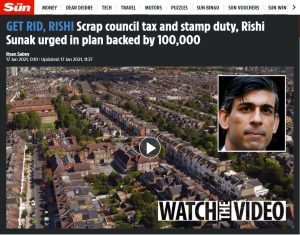
The Daily Mail also reported on the potential for a new property levy to replace Council Tax and Stamp Duty, stating "One of the main criticisms of the council tax system is that it is based on property valuations dating back to 1991 while stamp duty is viewed by critics as a barrier to people getting onto, and moving up, the housing ladder."
There was another positive review in The Metro, which said "Rishi Sunak is coming under pressure to ditch council tax and stamp duty completely. Almost 100,000 people have signed Fairer Share’s campaign to replace council tax, stamp duty and the controversial bedroom tax with a flat rate payment based on the value of a property."
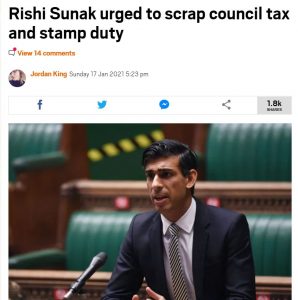
The Daily Express who have reported on the negative impacts of Council Tax most frequently since last March, said "Supporters of the plan say it will be hugely beneficial to voters in the red wall seats in the north that the Tories won from Labour in 2019. They also say scrapping stamp duty would remove the barrier to families trading up to a bigger home and elderly people in large houses downsizing."
The Daily Telegraph focused their ire on Stamp Duty with the headline: Stamp duty is Britain’s worst tax. It’s time to move on, Mr Sunak, which is far from surprising given their "Stamp out the Duty" campaign.
The Daily Star, City AM and ConHome also covered the story, with the former reporting "Charity Fairer Share is pushing for the Chancellor to kill off not only stamp duty but council tax as well, urging Mr Sunak to come up with a new, fairer tax for all property owners. They say one in four adults in the UK regularly go into debt in order to pay their council tax."
Why we're supporting Fairer Share
Now that we have reached the milestone of 100,000 households supporting our campaign, we wanted to hear the thoughts of our supporters on why a fairer property tax system is so important to them.
Here's what they had to say:
Susan from Staffordshire - "I’m supporting your campaign because I believe that as a renter rather than a home owner that it is the landlord who should be paying the majority (if not all) of the Council Tax."
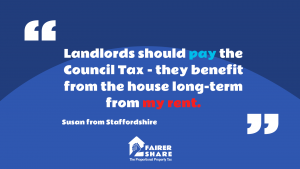
Shaylee from Kent - "I am supporting your campaign as it is a subject close to my heart and affects myself and my family. I think we live in a society where families struggle daily with basic household bills and the cost of living but much of this goes under the radar. We are encouraged to save for our families' futures, but with ever increasing bills such as Council Tax this just isn’t possible. A lower, and a more evenly distributed system for Council Tax would help many families."
Claire from Gloucester - "Your scheme is incredible and appears to be much fairer than the current scheme. As a single mum working full-time in a primary school throughout the pandemic, putting myself at risk daily, I bring home a shockingly low wage and with two teenage boys eating me out of house and home, I'm sad to say all of my money goes on bills with Council Tax being a big one. Treats are few and far between and there is no chance at all to save - it really does feel like us low-earners live to work."
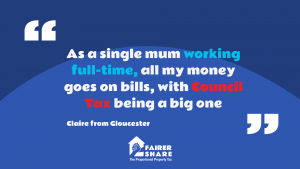
Maxine from Manchester - "Everyone is going through the same challenges because of this horrendous nightmare of a pandemic which means that many businesses are closed. Thousands upon thousands of people don't have as much money coming through to pay their bills. Fairer Share would like the government to replace Council Tax altogether. This would help immensely people that just don't have enough funds. People are having to consider do they feed themselves or put the heating on. This is just horrendous!!!"
Becca from Doncaster - "Where I live you pay council tax but nothing is ever improved. It feels that half of our money gets swallowed up. The government are very good at helping the rich get richer and the poor get poorer, it's about time someone stuck up for the average Joe and said enough is enough."
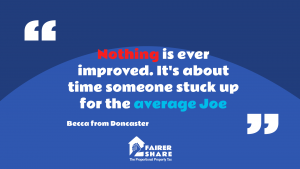
Keith from Birmingham - "It’s been a bad last 8 months since the pandemic started and I have been struggling to keep on top of bills and especially Council Tax. I am supporting your campaign as I believe that Council Tax is too high and the council have cut services to the bone but every year the tax keeps rising."
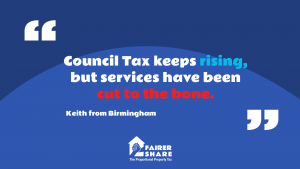
If you would like to get in touch and let us know why you're supporting our campaign, please email us at support@fairershare.org.uk
A fairer tax system is essential to ‘building back better’
This article originally appeared in Oxfam's 'Views & Voices' blog on December 16th, authored by Robert Palmer, Executive Director, Tax Justice UK.
Tax Justice UK shares Oxfam’s commitment to tackling inequality, eradicating poverty and standing up for those who typically struggle to get their voices heard. The need to address these issues has only become more urgent in light of the covid-19 pandemic, which in the UK as elsewhere has had a disproportionate impact on the most vulnerable in society, including ethnic minorities and those in low-paid and insecure work.
As news of vaccine breakthroughs finally put an end to the crisis in sight, it would be easy and tempting to revert to the status quo. But recovery from the pandemic provides us with a rare opportunity to place society on a more equitable foundation, including a fairer system of taxation.
Prior to the crisis, the UK’s tax system – unfair, poorly-understood and ineffective – was already in dire need of reform. But with the government signalling that it intends to increase taxes in the coming years, now is the time to undertake reform so that tax rises do not aggravate the failures of the current system.
One of Tax Justice UK’s key priorities is campaigning for greater taxation of wealth. In the UK, wealth is undertaxed in comparison to income, exacerbating a highly unequal distribution of wealth in which just 10% of households own 40% of all household wealth. Taxing wealth more effectively would not only reduce this inequality but provide additional public funding for our increasingly stretched schools, hospitals, social care and the many other public services people rely on.
Our manifesto for tax equality, in which we set out the case for greater taxation of wealth, identifies council tax and stamp duty as particularly problematic and ripe for reform. By taxing people living in lower-value housing more – as a proportion of property value – than people living in multi-million-pound mansions, council tax is a deeply regressive tax that unfairly benefits the UK’s wealthiest individuals and regions. Stamp duty, while more progressive, makes it unnecessarily costly to downsize or move home, creating economic inefficiencies. The manifesto calls for a proportional property tax to replace both taxes, which unlike council tax would tax homeowners consistently based on a fixed percentage of property value.
Despite a growing consensus among experts and across the partisan divide that council tax is unfit for purpose, the ever-growing arguments and evidence in favour of its abolition have so far struggled to cut through. That is why Fairer Share, a new grassroots campaign to replace council tax with a proportional property tax, is so important. By setting out the problems with council tax in an accessible and intuitive way and putting forward a detailed and fully costed alternative, Fairer Share is making a valuable contribution to the UK’s burgeoning movement for progressive tax reform.
That’s why earlier this year Tax Justice UK was delighted to sign an open letter to the Chancellor, coordinated by Fairer Share and supported by organisations across the political spectrum including the Institute for Public Policy Research (IPPR) and Demos calling for property tax reform. The letter urged the government to “conduct a thorough review of Britain’s residential property taxes” and replace council tax and stamp duty with a fairer system, based on property value and ability to pay.
Since the poll tax riots in 1990, which directly led to the introduction of council tax, successive governments have tried their best to avoid the topic of property tax reform. This is partly due to understandable concerns about the complexity of the task, and partly due to less noble fears of alienating donors and wealthy homeowners in key constituencies.
Yet in recent years a growing body of research and analysis has gone a long way in resolving many of the objections associated with council tax reform. And when it comes to public opinion, politicians have less to fear than they might think. Polling conducted by Fairer Share shows that just 29% of the public believe that the way council tax is calculated is fair, while only 33% favour keeping it unchanged. Meanwhile, recent research by Tax Justice UK shows that a majority of people want to see wealth taxed more, including 64% of Conservative voters and 88% of Labour voters, with 67% in favour of tying property tax more closely to a home’s current value.
Once the covid-19 crisis subsides, the government will attempt to meet its ambitions of “building back better” and “levelling up”. Tax reform, including replacing council tax, must be part of that agenda. Tax Justice UK looks forward to working alongside Fairer Share and other like-minded organisations in the coming months and years to ensure that is the case.
LISTEN | Conservative MP explains why Council Tax must be replaced
After the launch of the Conservative's Property Research Group, the following interview took place with its Chair, Kevin Hollinrake MP, on talkRADIO on 11/12/2021.
At Fairer Share, we look forward to presenting our solution for The Proportional Property Tax to the Property Research Group in the coming months.
00:50 - Introducing Kevin Hollinrake MP.
01:07 - The problem with Council Tax.
01:35 - Why this call for reform is very different to the Poll Tax.
02:35 - How Stamp Duty harms the economy.
03:48 - What is the aim of the Property Research Group?
05:10 - END


